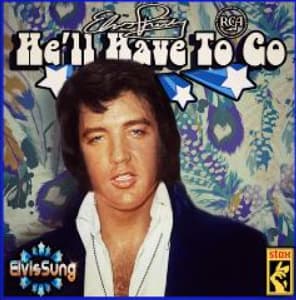
A Haunting Farewell and a Melancholy Goodbye
It was a cold October night in 1976, and the air in the Jungle Room at Graceland was heavy with a palpable sense of finality. The iconic voice of the King, Elvis Presley, filled the space, not with the typical swagger and rock and roll energy, but with a deeply poignant, almost heartbreaking vulnerability. He was recording what would become the very last song of his career, a cover of Jim Reeves’ 1960 hit, “He’ll Have to Go.” This wasn’t a planned studio session; it was a simple, raw, and unadorned moment captured in his own home. This final recording would eventually find its place on the posthumous 1982 compilation album, “The Elvis Medley,” released by RCA Records. Though it wasn’t a major chart hit at the time of its release as a part of a medley, the song’s inclusion became a significant, almost sacred, piece of his discography, a testament to the man’s enduring musical spirit even in his twilight.
The story behind this last recording is as somber as the song itself. The original plan for that night was a full studio album, but Elvis, in a state of physical and emotional decline, simply couldn’t muster the strength or the focus for a formal session. The legendary producer Felton Jarvis, recognizing the gravity of the situation, decided to bring the recording equipment to Graceland. They set up in the famously unique “Jungle Room,” surrounded by its eclectic and somewhat bizarre decor. It was here, in this deeply personal and familiar space, that Elvis gave his final performance. The circumstances surrounding the session—the late hour, the intimate setting, and the King’s own fragile state—lend an almost mythical quality to the recording. It’s a snapshot of a man grappling with his own mortality and the end of an era. The unadorned quality of the recording, the slight imperfections in his voice, and the raw emotion laid bare, make it a uniquely powerful and haunting listen.
The meaning of “He’ll Have to Go” is a universal tale of love, loss, and the impossible choices we sometimes face. The song tells the story of a man who makes a phone call to his lover, who is with another man, pleading with her to leave her new partner and come back to him. The line, “Put your sweet lips a little closer to the phone,” is a desperate plea for connection and intimacy, a final attempt to bridge the distance between them. For Elvis, a man whose life was defined by both immense love and profound loneliness, the lyrics must have resonated on a deeply personal level. His delivery isn’t just a performance; it’s a confessional. He’s not just singing the words; he’s living them, his voice thick with a mix of longing, regret, and a quiet, weary resignation. It’s an aural mirror reflecting the sadness that had become a constant companion in his final years.
For those of us who grew up with the King, this particular song is more than just a piece of music; it’s a time capsule, a fragile memory of a time gone by. It conjures up images of simpler days, of dancing to his records on a juke box, of watching him on the big screen, and of the collective sadness we felt when we heard the news of his passing. The song doesn’t just remind us of Elvis; it reminds us of our own youth, of the people and moments we’ve lost along the way. Listening to “He’ll Have to Go” is a bittersweet experience, a gentle tug on the heartstrings. It’s a final, poignant goodbye from the man who once gave the world so much joy. The King may have left the building, but this last song ensures that his voice, full of heartache and humanity, will echo in our memories forever.